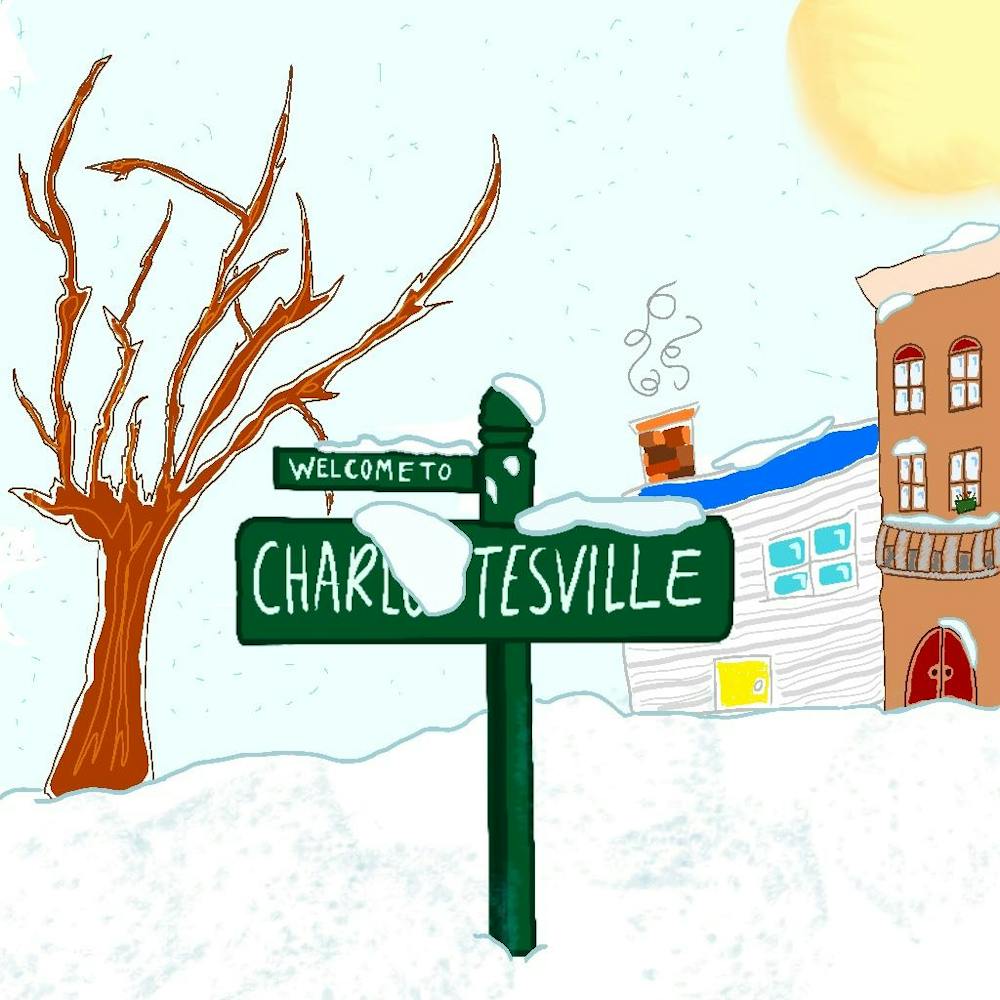The Cavalier Daily does not regularly cover meteorology. If we did, our forecast would tell you what countless others are saying — Charlottesville is covered in nearly two days of snow. This pair of storms is the third major snow system the City has faced in what has been a turbulent winter. Worse than the snow and ice, however, is the disarray caused by a lackluster City-wide response. The City’s snow response is not just costing you time with more traffic — it is directly endangering pedestrians and drivers alike. With weeks left of an already snowy winter, the City of Charlottesville needs to direct more funding and resources to its snow response infrastructure.
On its website, the City lays out explicit expectations for how to handle winter weather, involving cooperation between both civilians and City officials. On one side of these expectations, the City expects citizens to remove the snow on private property. This leaves many of the sidewalks that line our city streets under the responsibility of citizens. On the other end of the bargain, the City must lay salt to prepare for storms, as well as clear paths for vehicles in streets once snow has arrived. It is beneficial that Charlottesville has clearly communicated expectations. Nevertheless, planning which is good on paper has not eased the danger brought by winter storms.
The first storm of the winter was a testament to this danger. After the storm Jan. 5, Virginia State Police reported that there were over 400 total car incidents across the Commonwealth, with many of these taking place at the University. Things are not any safer for pedestrians. Even under the best weather conditions, the life of a pedestrian is not always a safe one with Charlottesville’s current infrastructure exacerbating this danger — evident in the 20 percent rise in Charlottesville emergency room visits following the Jan. 5 storm. Sidewalks, a responsibility of the citizens, often fail to be cleared. And even when they do get cleared, the City warns that it is “unavoidable” for plows to accidentally cover sidewalks up again. With sidewalks clogged, many take to walking in the streets, which the City points out is particularly dangerous in winter weather. And what is dangerous for able-bodied citizens is simply unnavigable for Charlottesvillians with disabilities.
The City-wide chaos that follows storms is the direct result of Charlottesville’s own budgeting decisions. Charlottesville has assigned sole responsibility for snow management to the Street and Sidewalk Services, a division of the City’s Department of Public Works. However, this was the only one of seven Public Works divisions to be defunded this year. This year’s budget saw funding for snow removal reduced by nearly 25 percent. Granted, the City has seen milder winters in recent years, and snow totals can vary drastically year to year. But even as temperatures increase, winter storms are not going away — in fact, they may become more intense in years to come.
Money for the Street and Sidewalk Services is spent on snow response during storms, as well as on preventive measures in the days prior. Therefore, budget cuts targeting this division of Public Works leave the City unprepared for any and all winter weather. Budget cuts mean less drivers plowing streets. It means less salt being dumped to prevent ice from forming. Altogether, the choice to defund snow management puts a greater strain on the partnership for removal laid out by the City.
Budget cuts were made under the assumption that Charlottesville residents would continue handling their end of the snow bargain. But Charlottesvillians have long been struggling to do that, leaving many sidewalks and walkways uncleared. The infrequency of storms makes it easy for civilians to just hunker down inside and wait out storms — such advice is echoed from veteran residents to newer ones. And so, many sidewalks and driveways fail to be cleared within the 24-hour timeframe enforced by city code. The snow ices up and then lasts for weeks. Even as temperatures increase enough to thaw and melt the snow, the subsequent runoff just freezes up again overnight, creating a vicious cycle that makes winter conditions last weeks. Two-thirds of University students can attest to this cycle in their living Off-Grounds — students off of 14th in particular. While this admittedly turns Grounds into something out of a snowglobe, it does so directly at the expense of our safety.
Luckily, this infrastructural disaster has a straightforward fix. It begins with the City more earnestly reckoning with the culture of its citizens. No matter how many times the City releases statements outlining Charlottesvillians responsibilities during winter weather, the habit of hunkering down during a storm is unlikely to change. Instead of relying on the expected benevolence of civilians, the City should take full responsibility for the clearing of sidewalks throughout the City. To match this increase in responsibility, the City should dedicate more resources and funding to winter maintenance. An increase in funding would bring our snow management budget up to the level of Staunton and other comparable cities. Winter is not going away — the City must prepare accordingly.
Dan Freed is a senior opinion columnist for The Cavalier Daily. He can be reached at opinion@cavalierdaily.com.
The opinions expressed in this column are not necessarily those of The Cavalier Daily. Columns represent the views of the authors alone.







